Children with disabilities receive support to thrive in school
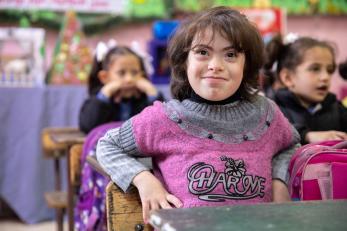
Summayya, a 6-year-old Jordanian student with Down Syndrome, squeals and laughs with delight as she runs and plays with Asma, her shadow teacher. The school courtyard is bustling — it’s recess — as a swarm of other young girls laugh, play games and sprint past the neon walls in all directions.
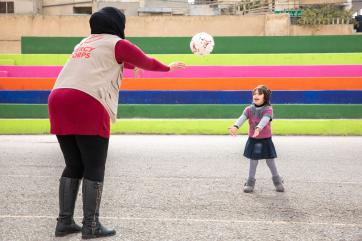
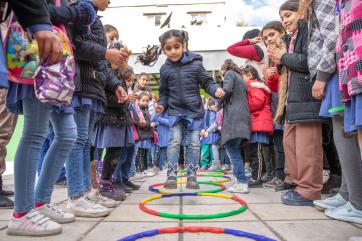
Asma, with seemingly boundless energy, has just finished leading a game with Summayya: a special, structured group activity to increase acceptance and inclusivity of students with disabilities and others who are socially isolated.
As her shadow teacher, Asma is specially trained to provide one-on-one support like this during every step of Summayya’s school day, so Summayya has the assistance she needs to be integrated into the school system and successfully receive an education.
Before starting at this inclusive school, Summayya’s prospects were dismal — several other schools refused to enroll her altogether due to insufficient resources for supporting children with disabilities. Now attending first grade at an inclusive school and having Asma’s support, Summayya’s future is infinitely brighter.
Installing shadow teachers like Asma is part of Mercy Corps’ inclusive education program, which aims to boost school enrollment of students with disabilities in addition to improving the quality of the education they receive.
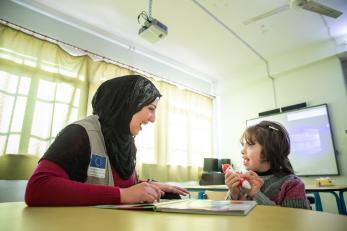
Shadow teachers are trained to provide specialized support to students with disabilities, including assisting them in mainstream classrooms, facilitating individualized lessons in a small activity room called a resource room, and attending group activities. They develop unique education plans for each student they oversee, then coordinate with Mercy Corps team members for feedback and support reaching their identified goals. Shadow teachers also serve as resources for the mainstream teachers to better serve students with disabilities and provide different ways to teach certain concepts to all their students.
“Many teachers used to reject the presence of children with disabilities in their classes,” said Asma. “Now, they are much more flexible, and whenever the shadow teachers come with children who need to be integrated in school, teachers are more accepting of the challenge.”
Throughout Summayya’s school, music and laughter fill the corridors, clusters of students are busy with different games and activities and, as an additional part of the program, many classrooms are outfitted with special equipment or instruction methods to meet the needs of students with varying disabilities.
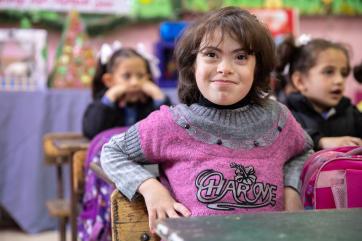
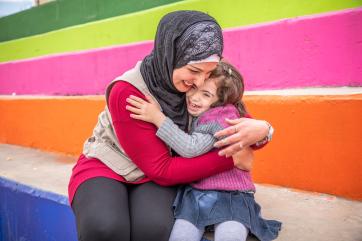
For Summayya, a silly, joyful and gregarious girl, being able to attend school has been transformative. While she was once confined to home and without a productive routine, Asma says Summayya is now behaving better, is better able to express herself, has improved her speech and physical coordination, formed relationships and is progressing on learning her shapes and numbers. And as she laughs and proclaims with large hand gestures how much she loves Asma, the bond they also share is undeniable.
This project, funded by the European Union, UNICEF and Porticus, supports over 5,200 children with disabilities in over 100 schools across Jordan with the support of 224 shadow teachers.